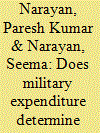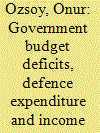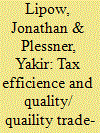|
|
|
Sort Order |
|
|
|
Items / Page
|
|
|
|
|
|
|
| Srl | Item |
| 1 |
ID:
083228


|
|
|
|
|
| Publication |
2008.
|
| Summary/Abstract |
Fiji's total debt stands at 65% of GDP. Domestic debt constitutes 55% of GDP. The goal of this paper is to investigate whether military expenditure has contributed to Fiji's exploding debt levels over the period 1970 to 2005. Our empirical analysis, conducted within a cointegration and vector error-correction framework, suggests that, in the long-run, military expenditure has had a statistically significant positive impact on both external debt and domestic debt, while income has had a statistically significant positive impact on domestic debt and a statistically significant negative impact on external debt. We explain the reasons behind this finding and draw some policy implications.
|
|
|
|
|
|
|
|
|
|
|
|
|
|
|
|
| 2 |
ID:
083226


|
|
|
|
|
| Publication |
2008.
|
| Summary/Abstract |
Critics of trade liberalization argue that globalization increases countries' vulnerability to economic shocks and hence may exacerbate domestic social conflict. Such social conflict may also be transformed into armed conflict. Others argue that globalization promotes economic growth and reduces poverty, which leads to a reduction in the risk of internal conflict. Several studies find trade to reduce the risk of interstate conflict. This article investigates the impact of trade and trade shocks on the risk of intrastate conflict. A set of operationalizations of economic shock is developed and used to analyze the risk of conflicts that involve at least 25 battle deaths per year. The analysis finds no robust evidence for a direct relationship between trade openness, trade shocks, and the risk of armed conflict. There is somewhat more basis for concluding that globalization affects the risk indirectly through its effect on long- and short-term growth. In the long run, trade-induced growth reduces the risk of domestic conflict.
|
|
|
|
|
|
|
|
|
|
|
|
|
|
|
|
| 3 |
ID:
083227


|
|
|
|
|
| Publication |
2008.
|
| Summary/Abstract |
This paper analyzes the relationship between government budget deficits, defence expenditure and income redistribution among different social-income groups in Turkey for the period 1965-2003. The analysis was based on a five-equation vector auto regressive (VAR) model and impulse response functions (IRFs) derived from the VAR model. The study finds that the deficit as a percentage of GNP has a negative and significant impact on transfer payments as a percentage of GNP. The IRFs indicate that shocks to deficit expenditures as a percentage of GNP (DEFGNP) have statistically significant impacts on defence spending as a percentage of GNP (DSGNP), educational expenditures as a percentage of GNP (EDGNP), health expenditures as a percentage of GNP (HEGNP), and transfer payments as a percentage of GNP (TPGNP). The results derived from this study also indicate that there is a positive and significant relationship between defence spending as a percentage of GNP and deficits as a percentage of GNP. Therefore, defence spending is viewed as a tool for transferring income among different social-income groups and across generations in Turkey for the period 1965-2004. As a result of this, the government can use deficit and defence spending as one of the major instruments to transfer income among different social-income groups and across generations in Turkey.
|
|
|
|
|
|
|
|
|
|
|
|
|
|
|
|
| 4 |
ID:
083225


|
|
|
|
|
| Publication |
2008.
|
| Summary/Abstract |
Considering the importance of military expenditures on political and economical success of a government, this empirical study analyzes the relations between political stability, economic growth and military expenditures. Based on the theoretical model developed by Blomberg (1996), the vector autoregression analyzes results for a democratic country and indicates the significance of military expenditures on political stability and private sector investment decisions.
|
|
|
|
|
|
|
|
|
|
|
|
|
|
|
|
| 5 |
ID:
083223


|
|
|
|
|
| Publication |
2008.
|
| Summary/Abstract |
In the defense policy literature, it is widely believed that there is a pronounced bias towards the procurement of a less than optimal number of excessively sophisticated weapons. In this paper, we consider the possibility that this perceived bias is the result of the timing and informational structure of defense procurement decisions, and the interrelationship of this structure with overall fiscal policy. Specifically, this paper presents a model that suggests that tax smoothing considerations of the type first articulated in Barro (1979) could lead social welfare maximizing decision makers to choose a higher level of weapon quality than would be optimal if government revenue could be raised without resort to distortionary taxation.
*The authors would like to thank Alan Viard of the Dallas Federal Reserve Bank, participants in the 2005 Ne'eman Institute Seminar in the Economics of National Security at Tel Aviv University, and two anonymous referees for their comments and insights.
|
|
|
|
|
|
|
|
|
|
|
|
|
|
|
|
| 6 |
ID:
083224


|
|
Why Iraq?
/ Lowenberg, Anton D; Mathews, Timothy
|

|
|
|
|
| Publication |
2008.
|
| Summary/Abstract |
The US claim that the invasion and occupation of Iraq was a necessary component of the war on terror has been roundly criticized in both popular and scholarly discourse, while many major US allies were unsupportive. However, the present article argues that the US strategy can be viewed as a rational approach to combating transnational terrorist attacks on the American homeland. By deploying a large, activist contingent of troops in a geographical location relatively close to the terrorists' base of operations, a target country can, under certain specified circumstances, successfully deflect terrorist attacks away from domestic civilians, even if the effect of such deployment is not directly to diminish the terrorists' capacity to launch attacks. The interaction between the target government and a terrorist organization is characterized as a sequential move game, the solution to which identifies the conditions under which a deflection strategy maximizes the expected payoff to the target government. It is shown that the deflection strategy makes most sense when the perceived cost of a terrorist attack on the homeland is high and when the target nation is militarily strong and confident of success, has a relatively small proportion of its domestic population that is sympathetic to the terrorists' cause, and is geographically distant from the main base of terrorist operations. Target countries for which one or more of these conditions are absent might be expected to rationally reject such a strategy
|
|
|
|
|
|
|
|
|
|
|
|
|
|
|
|
|
|
|
|
|